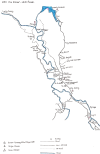A qualitative study exploring the epistemology of suffering within a Malaysian Indigenous tribe
- PMID: 38356281
- PMCID: PMC12130592
- DOI: 10.1177/13634615231225158
A qualitative study exploring the epistemology of suffering within a Malaysian Indigenous tribe
Abstract
Despite the universal nature of suffering, few studies have examined how Indigenous ethnic minorities in non-western regions understand and respond to adversity. This study explored the epistemology of suffering among the Temiar ethnic group of Peninsular Malaysia using participant observation and semi-structured interviews. Interview transcripts of 43 participants were coded through inductive thematic analysis and a consensual qualitative approach. Three-tier themes were defined and named after subsequent analysis of core ideas and domains in the data. Major adversities reported included a lack of basic needs, lack of land-rights and unjust treatment from authorities, destruction of the forest environment and livelihood, and lack of accessibility and facilities, which were attributed to authorities' negligence of responsibilities, increasing human-animal conflict, environmental threats and imposed lifestyle changes. Faced with adversity, the Temiar endeavoured to survive by working crops and gathering forest resources. They utilized resources from family, fellow villagers, external agencies and spiritual-religious traditions. Theoretical mapping of attribution styles into the Ecological Rationality Framework revealed predominantly external-focused and concrete-perceptual rationalities privileged by strong-ties societies. These findings pointed to the resilience of a strong-ties community while adapting to the systemic suffering and risk factors stemming from a rationality mismatch with modernization and globalization trends. To conclude, we advocate for culture-sensitive mental health and psychiatric practices, as well as sustainable development for the well-being of Indigenous communities locally and globally.
Keywords: Indigenous peoples; Indigenous psychology; help-seeking; suffering; worldview.
Conflict of interest statement
Declaration of Conflicting InterestsThe authors declared no potential conflicts of interest with respect to the research, authorship, and/or publication of this article.
Figures
Similar articles
-
Health and saliva microbiomes of a semi-urbanized indigenous tribe in Peninsular Malaysia.F1000Res. 2019 Feb 11;8:175. doi: 10.12688/f1000research.17706.3. eCollection 2019. F1000Res. 2019. PMID: 31275564 Free PMC article.
-
Prevalence and severity of anaemia among the Temiar sub-ethnic indigenous Orang Asli communities in Kelantan, Peninsular Malaysia.Front Public Health. 2024 Aug 7;12:1412496. doi: 10.3389/fpubh.2024.1412496. eCollection 2024. Front Public Health. 2024. PMID: 39171304 Free PMC article.
-
What do you mean by engagement? - evaluating the use of community engagement in the design and implementation of chronic disease-based interventions for Indigenous populations - scoping review.Int J Equity Health. 2021 Jan 6;20(1):8. doi: 10.1186/s12939-020-01346-6. Int J Equity Health. 2021. PMID: 33407544 Free PMC article.
-
Qualitative Study.2022 Sep 18. In: StatPearls [Internet]. Treasure Island (FL): StatPearls Publishing; 2025 Jan–. 2022 Sep 18. In: StatPearls [Internet]. Treasure Island (FL): StatPearls Publishing; 2025 Jan–. PMID: 29262162 Free Books & Documents.
-
"We do not stop being Indigenous when we are in pain": An integrative review of the lived experiences of chronic pain among Indigenous peoples.Soc Sci Med. 2025 May;373:117991. doi: 10.1016/j.socscimed.2025.117991. Epub 2025 Mar 20. Soc Sci Med. 2025. PMID: 40158447 Review.
Cited by
-
Impact of Health Education on Infectious Disease Knowledge in Indigenous Communities in Northwestern Malaysia.Trop Med Infect Dis. 2025 Jul 9;10(7):191. doi: 10.3390/tropicalmed10070191. Trop Med Infect Dis. 2025. PMID: 40711068 Free PMC article.
References
-
- Abdullah J., Borhan M. A., Ahmad C. B. (2015). Orang Asli resettlement in urban environment at Bukit Lanjan, Selangor, Malaysia. Procedia - Social and Behavioral Sciences, 201, 71–79. 10.1016/j.sbspro.2015.08.132 - DOI
-
- Abdullah J., Sayuti N. M., Arshad A. A., Embong M. R. (2016). Living conditions in orang Asli resettlement project (PROSDET) of pantos, Pahang, Malaysia. Procedia - Social and Behavioral Sciences, 222, 143–150. 10.1016/j.sbspro.2016.05.204 - DOI
-
- Abdullah M. F., Othman A., Jani R., Edo J., Abdullah M. T. (2021). Orang Asli health and mortality in Hulu Terengganu, Malaysia. Resource Use and Sustainability of Orang Asli, 189–199. 10.1007/978-3-030-64961-6_12 - DOI
-
- Alias A., Kamaruzzaman S. N., Daud M. N. (2010). Traditional lands acquisition and compensation: The perceptions of the affected aborigine in Malaysia. International Journal of Physical Sciences, 5(11), 1696–1705. Retrieved from https://www.researchgate.net/publication/265812615_Traditional_lands_acq...
MeSH terms
LinkOut - more resources
Full Text Sources
Medical



